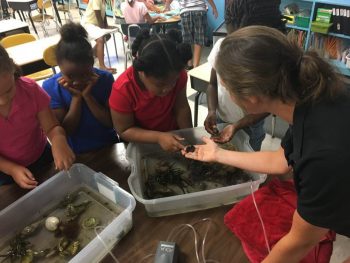 Sunset Park Elementary School students got up close with area marine creatures, as the North Carolina Coastal Federation brought touch tanks into the classroom for a recent program to wrap up a year of lessons with the school. Support from the Landfall Foundation and Holiday Inn made the program possible.
Sunset Park Elementary School students got up close with area marine creatures, as the North Carolina Coastal Federation brought touch tanks into the classroom for a recent program to wrap up a year of lessons with the school. Support from the Landfall Foundation and Holiday Inn made the program possible.
Throughout the course of the school year, the Wrightsville Beach office staff have been busy at various schools teaching students of all ages about the local environment, stormwater, oysters, marine debris and more.
Kate Conery, AmeriCorps member at that office, has led and planned many of these lessons. In addition to Sunset Beach Elementary, she also spent time with students at Lake Forest Academy, the Blue Ribbon Commission on the Prevention of Youth Violence’s after-school programs (BRC) and Bradley Creek Elementary School. Over the course of the school year, Conery was able to work with the students on a consistent basis and reinforce their environmental lessons.
“Forming these types of relationships with students and teachers at Title I schools is probably the highlight of my time here as an AmeriCorps member. Many of the students we work with have never visited a salt marsh or even seen marine organisms before so giving them the opportunity to handle them is a real treat,” Conery said.
At Sunset Park Elementary School, Conery worked with second-grade students and focused lessons on stormwater runoff. By the time they got to the touch tank activity, these students had already learned about how reducing stormwater runoff benefits these marine creatures. Throughout the year, students participated in a stormwater model demonstration, played stormwater hopscotch and saw stormwater reduction projects at work when taking the Walk the Loop for Clean Water Tour.
“One of the teachers said her student was inspired to write a nonfiction book on stormwater runoff after our programs, so that was pretty cool, although I never did get to read a copy,” Conery said.
At the touch tank program, Conery and interns Destiny Clayton and James Arnuk taught students about hermit crabs, sea spiders, brittle stars, oysters, mussels, clams, different types of algae and a horse conch that was about a foot-long.
Conery and other Wrightsville Beach office staff and interns did similar programs with BRC students in grades kindergarten through fourth. The federation has worked with BRC for a few years now on stormwater lessons and marine debris. Conery said BRC students were also most excited about the marine animals.
The federation also worked with elementary and middle school students at Lake Forest Academy, a nontraditional alternative school in Wilmington.
With the elementary school students, Conery played a game called “stormwater bowling” to show students how rain gardens can capture pollutants headed toward local waterways through rain water.
The federation’s programs with the middle school students focused on coastal habitats before taking a field trip to Carolina Beach State Park.
“Most of these students had never been to a salt marsh before, so they had a really great time catching their own organisms before Ted led a discussion about everything we caught,” Conery said. “The big catch for the day was a pipefish, which is similar to a seahorse, but we came away with lots of different organisms like fiddler crabs, blue crabs, mummichogs, and pinfish.”
Conery and other staff members also spent time with Bradley Creek Elementary School kindergartners, who were eager to share what they had learned with her when they saw her at the Earth Day Festival in April. These students learned about stormwater, first by checking out a stormwater model demonstration and then by spending time in the school’s rain garden.
“Building relationships with students over the course of the school year and culminating most of the lessons with a really memorable, positive experience was great,” Conery said.
